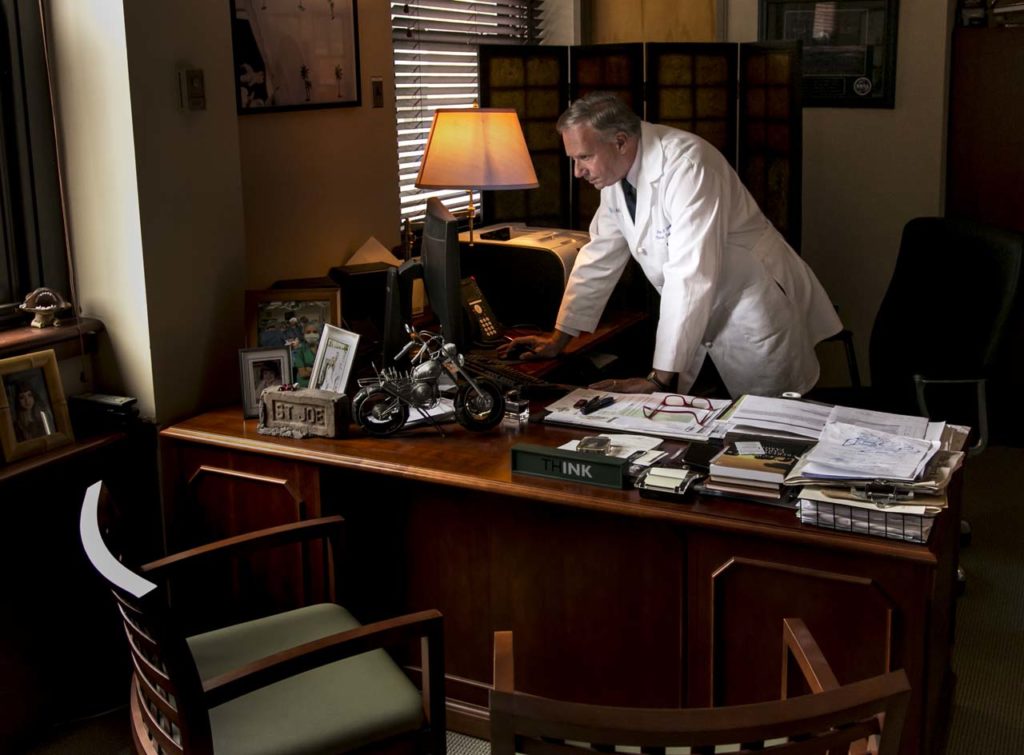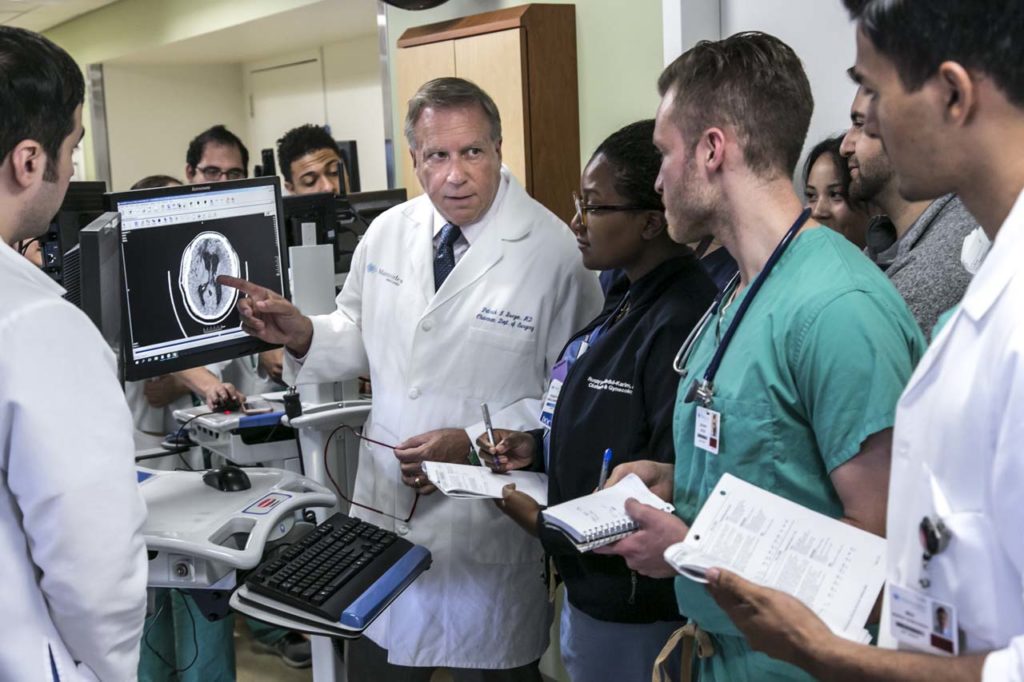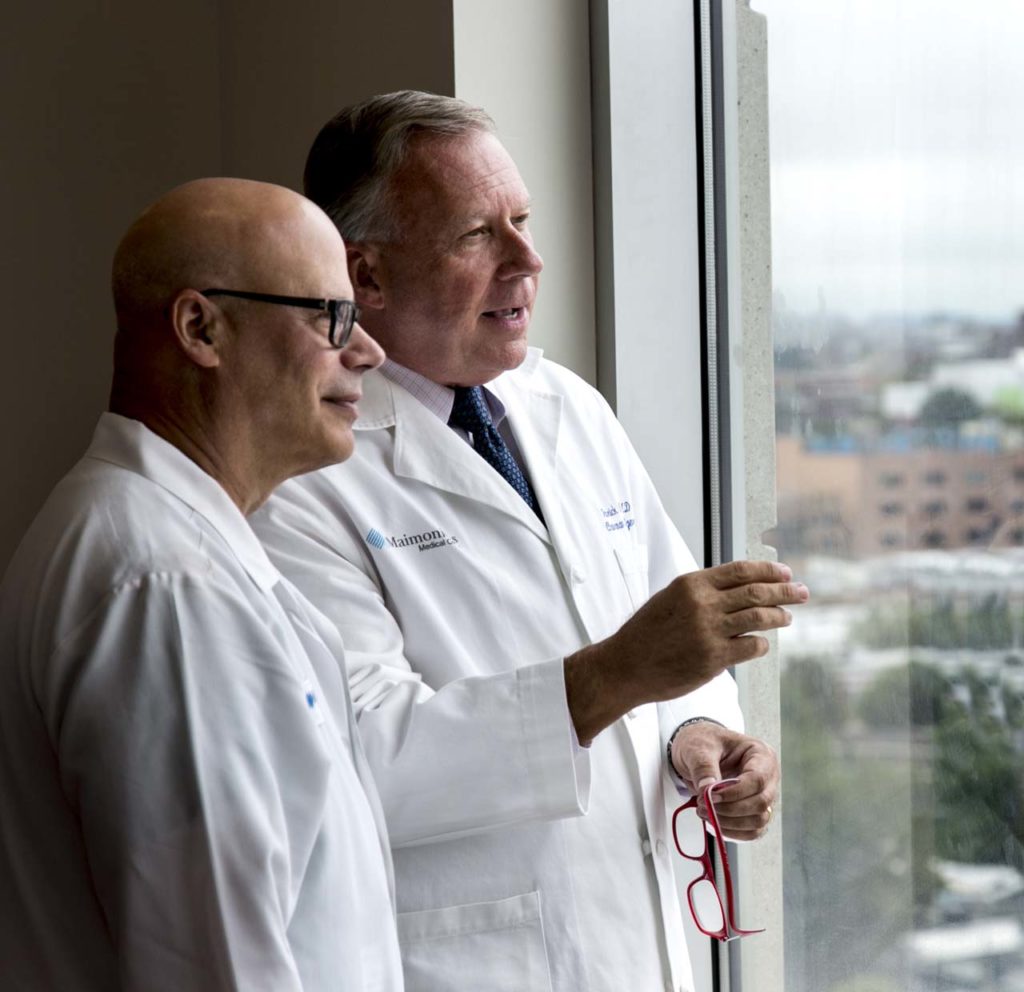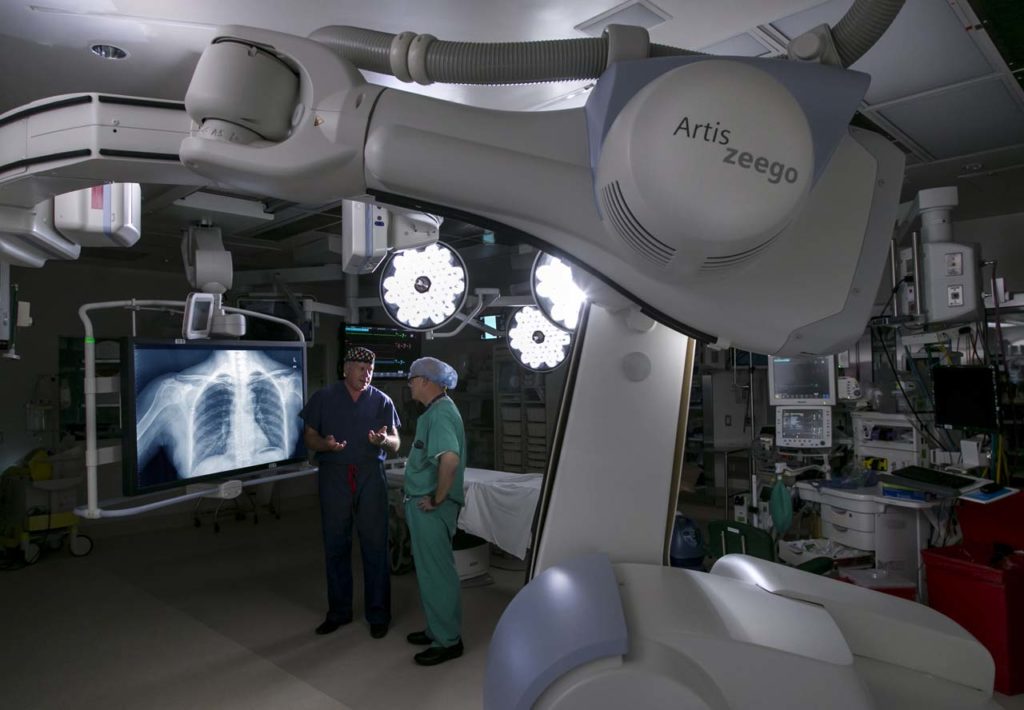THE CHIEF OF MAIMONIDES MEDICAL CENTER’S DEPARTMENT OF SURGERY, ON STRATEGIES FOR EXPANDING THE HOSPITAL’S SCOPE, TREATMENT OPTIONS, AND BOROUGH IMPACT
BY JESSICA JONES GORMAN • PHOTOS BY AMESSÉ PHOTOGRAPHY
When Dr. Patrick Borgen joined the department of surgery at Maimonides Medical Center in 2006, his goal was to build upon the hospital’s long history of excellence.
Maimonides has this very historic and very storied department of surgery,” Dr. Borgen explained. “The first heart transplant in America was done here by Dr. Adrian Kantrowitz in 1967—the same year he developed and patented the IntraAortic Balloon Pump. The first pediatric robotic surgical case was also performed in this hospital, and one of our previous chairs of surgery operated on Albert Einstein, treating an abdominal aneurysm. When I was named chair of surgery here, my only goal was to continue that tradition of excellence and innovation.”

Borgen, whose expertise includes cutting edge breast cancer treatment, brought decades of experience to the surgical staff at Maimonides.
“I spent the first 30 years of my life in South Louisiana, residing in a sleepy suburb of New Orleans,” Borgen said. “My father worked for NASA, which afforded me the opportunity to attend Tulane University and Louisiana State Medical School.” He went on to his general surgery residency at the Ochsner Clinic, one of the country’s largest non university based academic medical centers. But he still felt a desire to branch out.
“Breast cancer was always my passion, even in the beginning of my career, so I contacted a friend of a friend who was a big shot at Memorial Sloan Kettering and offered to work in their lab for free,” Borgen said. “My wife and I took out a loan and moved with our two children to New York City.” He lived off that loan for two years, then the hospital started paying him a salary. During his third year with the institution, he was asked to join the faculty, and in his fourth year was named Sloan’s chief of breast surgery, a position he held from 1993 until 2006.

“Clearly the investment of going there and working for free paid off for me,” he laughed. “I ran the breast cancer research lab and codirected all of the breast cancer activities at Sloan for 13 years. It was a task I loved wholeheartedly.”
A desire to take his expertise to an underserved area and build a comprehensive cancer center from scratch was what eventually brought Borgen to Maimonides Medical Center more than a decade ago.
“I wanted to take all of the wonderful lessons I learned at Sloan and apply them to an area of the city that really needed them,” he said. “I began looking into Brooklyn because I couldn’t believe that a borough of 2.5 million had no cancer center and no women’s health programs at all. None.”
Borgen met with the leadership at Maimonides, who had the wheels for such a center already in motion.
“They had already begun construction on what would become the only comprehensive cancer center in all of Brooklyn,” he said. “Over the next several years, we built a truly remarkable program, delivering world class care to the residents of this borough. In 2008, the Cancer Center expanded with the addition of a fully accredited Breast Center, which has been ranked in the top five percent of programs nationally.”
In 2009, Borgen was named chair of the entire department of surgery at Maimonides.
“The first change I made here was to close the faculty,” he noted. “At the time, the hospital allowed surgeons to operate at two or three different centers of care with no allegiance to one. I felt it was important for our surgeons to be full time employees of this hospital, and even though it was an expensive investment, the leadership at Maimonides agreed. We have hired 70 surgeons since.”
Borgen recruited for both values and training, hiring a staff that shared his passion for complete patient care.

“You can’t teach empathy or compassion; you either have it or you don’t,” he explained. “So, in addition to education, we considered how each doctor actually ‘treated’ their patients. My first hire was Dr. Greg Ribakove, who formerly served as vice chair of surgery at NYU. We were both cut from the same cloth, and together we built a massive department of supremely talented, empathetic, and compassionate doctors who were also self critical, always searching for a way to improve their own outcomes.”
Borgen also handpicked directors for each of the surgical department’s 20 divisions, each of which has achieved multiple accolades. In 2016, the hospital’s cardiac surgical program had the best outcomes of any program in New York City, and in 2017, Maimonides’ Cancer Center achieved a perfect score during an accreditation survey by the American College of Surgeons.
“I feel so strongly about the culture of excellence and compassion that we have created here,” said Borgen. “It’s not enough to take good care of someone; you have to make them feel well cared for, too, and I’m confident that is the case for each and every one of our patients,” adding that he’s also proud of the hospital’s unique research initiatives.
“As I’m sure you’re aware, there’s a national opioid abuse crisis happening in which millions of Americans are addicted to predominantly prescription painkillers largely prescribed by doctors and often diverted to the street,” he said. “Because research shows that four out of five heroin users got started with prescription pain meds, we started talking about what we in the medical profession can do to decrease the availability of these drugs.”
So, Borgen and the surgical staff introduced the Enhanced Recovery After Surgery Program (ERAS), in which physicians use a variety of strategies to eliminate post operative pain without having to turn to prescription painkillers.
“Breast cancer patients receive a novel, time released local anesthetic that numbs the area for 48 to 72 hours after surgery,” Borgen said. “The majority of those patients did not require a single pill and reported a low to zero pain score, so we’re also now doing it in colorectal and other types of general surgery. We’re hoping to apply it to pediatrics soon, and our goal in 2018 is to cut our total opioid usage by 50 percent. It’s a strong goal, but I think we’ll easily reach it and possibly take this program to a national level.”
The surgical chief also spoke of the innovation taking place in the hospital’s cardiac and vascular surgery departments. “Our hospital features one of Brooklyn’s only hybrid operating rooms in which a state of the art CT scanner gives doctors real time visuals of the organs they are working on,” he said. “We’ve successfully performed more than 200 TAVR [transcatheter aortic valve replacement] procedures with this equipment, and have an outstanding safety record with it.”
Maimonides has also taken extracorporeal membrane oxygenation (ECMO) to the next level, branding a program called ECMO to go, in which staff members go to other hospitals to share the lifesaving technique of providing prolonged cardiac and respiratory support to persons whose heart and lungs are failing.

“It’s a unique program and an exciting development for this hospital and the Brooklyn residents it serves,” Borgen concluded. “But building care for Brooklyners is the most important thing I’ve done in my whole career. I passionately love this borough, and am excited to be a part of its renaissance. I’m also thrilled to continue Maimonides’ historic mission of excellence.”
Maimonides Medical Center
4802 10th Avenue / 718.283.6000 /
maimonidesmed.org
